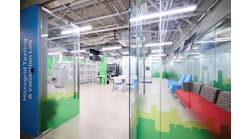SAN DIEGO, Calif. – If you operate a huge cloud campus, you have lots of options to procure renewable energy to support your data centers. If you’re a customer in a colocation facility, your choices are less clear.
A group of large tech companies is seeking to improve the green power options available to colocation customers. Fourteen companies are working with non-profit BSR, which has developed the Corporate Colocation and Cloud Buyers’ Principles to outline best practices for using renewable energy in multi-tenant facilities.
“If you’re Facebook you can build your own data center and choose your own power,” said Kelly Gallo, a Manager with the Future of Internet Power initiative at BSR. “If you’re not, it’s a challenge to work with your colocation provider to find options.”
The first step is for customers to ask their providers for green power, and a way to document their renewable usage for their corporate social responsibility programs. BSR (short for Businesses for Social Responsibility) has started the conversation with its buyers’ principles, which outline best practices in six areas.
Marquee Tech Firms Embrace Principles
The principles have been embraced by some of the largest users of colocation space, with signees including Facebook, eBay, LinkedIn, Akamai, Oracle, Salesforce, Workday, Adobe, HPE, Intuit, Etsy, VMware, Autodesk and CA Technologies. BSR has also sought input from leading colocation providers, including Equinix, Digital Realty, Infomart Data Centers and IO.
“We’re talking with our colo vendors,” said Serena DeVito, an Advanced Data Center Engineer in eBay’s Infrastructure Engineering team. “eBay and a lot of other companies can get together. This is the only way we can address this gap, by working with others in the industry.
“This is a must,” DeVito added. “If you don’t have clean power, forget it.”
The adoption of renewable energy is beginning to gain traction among colocation providers and wholesale data centers, who lease server space in cabinets, cages and data center suites.
These multi-tenant providers have been slower to adopt green energy than large hyperscale players like Google and Facebook, but represent a major opportunity to improve the industry’s impact on sustainability and carbon output.
Principles Address Six Areas
The BSR Corporate Colocation and Cloud Buyers’ Principles are non-binding, but designed to provide a common set of best practices that customers can affirm, providing a target for providers interested in winning or retaining their business.
“We start with industry awareness and beginning to ask for things,’ said Gallo, who discussed BSR’s efforts at the recent Green Data Center Conference in San Diego. “We want to make it the low-hanging fruit, the first step for companies thinking about criteria for their providers.”
“We see a lot of companies making big public commitments on sustainability,” Gallo added. “We’re looking at how you report those claims, and working with companies to help them make that progress.”
Kelly Gallo of BSR outlines the group’s Corporate Colocation and Cloud Buyers’ Principles at the Green Data Center Conference in San Diego. (Photo: Rich Miller)
The buyers’ principles address six topics:
- Options for Cost-Competitive Renewables: This could include bundled Renewable Energy Credits (RECs), direct access programs or bulk power purchase agreements (PPAs) that aggregates the buying power of multiple customers within a multi-tenant facility.
- Better Consumption Data: Customers want monthly data on consumption of energy, green house gases and sustainability that can be used in corporate reporting. “Getting that data can be tricky at colos,” said Gallo.
- Efficiency Incentives: Ideally, both the provider and customer should be motivated to be efficient and conserve power. Not all billing is structured so that tenants pay for use and are thus incentivized to reduce overall use of electricity. Customers and providers can work to set joint goals on items like PUE (Power Usage Efficiency, a key efficiency metric) and a facility’s energy mix
- Collaboration: “We’re seeing more and more interest from colo customers about their neighbors and their practices,” said Gallo. Allowing customers to “opt in” to being identified to other tenants within a colocation facility could help customers with smaller workloads to aggregate demand for a PPA.
- Detailed Disclosure: An issue for customers is being able to obtain data on renewable energy use at a specific data center site, as opposed to a company’s collective global footprint. This has obvious implications for site selection.
- Public Advocacy: The principles call upon providers to engage in public policy discussions on renewable energy. BSR notes that in 2015 colo customers and vendors in Virginia signed a letter to the state power commission to advocate for Dominion to consider more renewables, while a group of AWS customers sent a joint letter seeking better disclosure on the company’s energy sourcing.
BSR is currently in the first phase of its initiative, seeking to socialize the principles, recruit customers to sign on, and seek statements of support from cloud and colo providers. That will be followed by a game plan for customers.
“We’re going to develop a toolkit to put these principles into practice,” said Gallo. “We want to provide resources to support a step-by-step approach to meet these goals. We want to invite folks to pilot this.”
A number of colocation companies are working to provide renewable options for customers. This includes Switch, which operates the SUPERNAP campus in Las Vegas and just opened its new Citadel Campus in Reno. Switch was recently cited by Greenpeace for its leadership on renewable energy, which includes use of 100 percent renewable energy for all of its data centers, its advocacy for policies that support renewable energy, and its transparency in reporting green house gas emissions on a per-site basis.
Other multi-tenant providers prioritizing renewable energy for their customers include Equinix, Infomart and Digital Realty.
Customers Drive Greening of Colo
A big factor in colocation providers’ adoption of renewables is pressure from customers, many of whom are seeking renewable energy to support corporate sustainability goals.
“There are growing demands and requests from enterprise customers for cost-effective clean energy to power their data centers,” said Rick Crutchley, Chied Operating Officer of IO, in the recent DCF Executive Roundtable discussion of renewable power.
“In the past, sustainability groups were considered outside influencers in the IT and infrastructure decision making process,” added Brian Kortendick, a veteran industry executive who has worked with HPE, IO and BASELAYER. “Going forward we see these groups playing a prominent role early and often in many data center decisions.”
That includes BSR, a 25-year old non-profit that works to help businesses meet their sustainability goals. It’s not alone, as several other groups are working data center operators and other businesses gain access to renewable power:
- The Rocky Mountain Institute (RMI) has created the Business Renewables Center to create a marketplace for bulk PPAs between corporate users and renewable generators.
- The World Resources Institute (WRI) provides research and best practices to support sustainable practices with energy and water.
- The Renewable Energy Buyers Alliance is a consortium formed by BSR, RMI and WRI to educate the corporate sector on renewable power.
Gallo says that although all the signees of its buyers’ principles are tech firms, it hopes to eventually broaden its support to other industries.
“We’re gaining some momentum,” Gallo added. “We don’t want this to be a tech-only initiative. There are so many companies using a cloud and colo footprint.”






